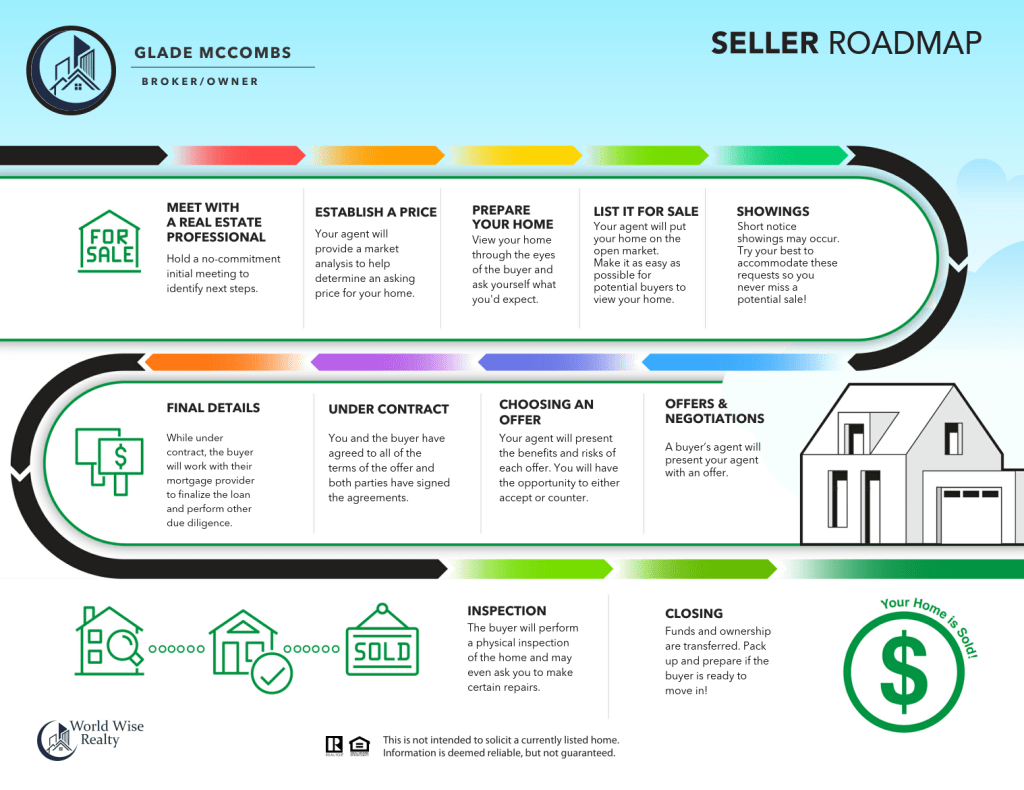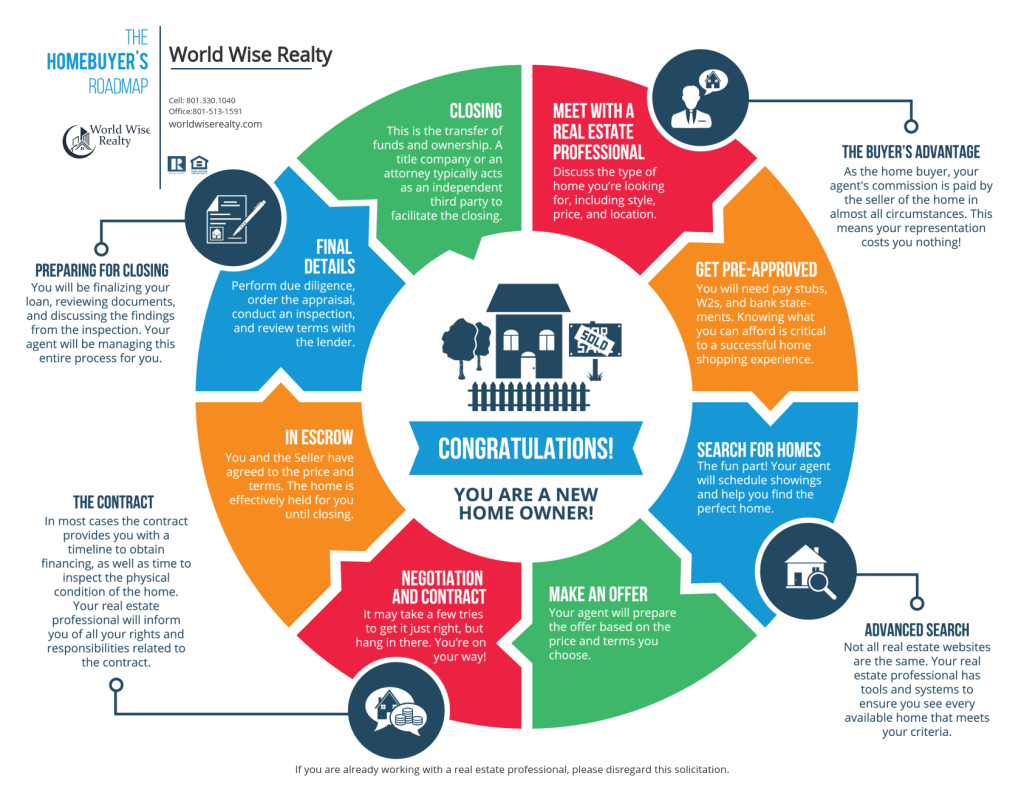World Wise Realty provides the following services for our clients:
- Listing Properties for Sale
- Representing Buyers in Acquiring Properties
- Property Management – Available Through our Affiliate Business
- Land Development – Commercial and Residential
- Helping Investors Find and Acquire Investment Properties
Listing Properties for Sale
The process for one of our trained Realtors to sell your home typically involves the following steps:
- Initial Consultation: You meet with one our Realtors to discuss your goals, expectations, and timeline for selling your home. The Realtor will assess the property, gather information, and answer any questions you may have.
- Comparative Market Analysis (CMA): Our skilled Realtors conducts a CMA to determine the appropriate listing price for your home. This involves analyzing recent sales of similar properties in your area to establish a competitive price.
- Preparing the Home: Your Realtor will provide recommendations on preparing your home for sale, such as decluttering, staging, and making any necessary repairs or improvements to enhance its appeal to potential buyers.
- Listing Agreement: You sign a listing agreement with the Brokerage, outlining the terms and conditions of the agreement, including the listing price, commission rate, and duration of the listing.
- Marketing and Promotion: Our Realtors have a comprehensive marketing plan to promote your home to potential buyers. This may include professional photography, virtual tours, online listings, print materials, open houses, and leveraging their network of contacts. Our listings are syndicated to over 60 online websites. Most of our listing are seen by 7,000-10,000 people online in just the first week.
- Showings and Open Houses: The Realtor schedules and conducts showings of your home, allowing interested buyers to view the property. They may also host open houses to attract more potential buyers.
- Negotiations and Offers: When an interested buyer submits an offer, the Realtor presents it to you and provides guidance on negotiations. They represent your best interests and work to achieve the most favorable terms and conditions.
- Contract and Closing Process: Once an offer is accepted, the Realtor assists in preparing the purchase contract and coordinates with all parties involved, including the buyer’s agent, lender, inspectors, and attorneys, to ensure a smooth closing process.
- Inspections and Due Diligence: The Realtor helps coordinate home inspections, appraisals, and any necessary repairs or negotiations that arise during the due diligence period.
- Closing and Transfer of Ownership: The Realtor works with the closing agent to finalize the sale transaction. They ensure all necessary documents are signed, funds are transferred, and the property title is transferred to the buyer.
Throughout the process, the Realtor provides ongoing communication, updates, and guidance to keep you informed and ensure a successful sale. Their expertise, market knowledge, and negotiation skills are instrumental in helping you achieve your desired outcome.
Representing Buyers in Buying Properties
The process for buying a property typically involves the following steps:
- Determine Your Needs and Budget: Assess your requirements, including the type of property, location, size, and amenities you desire. Evaluate your financial situation to determine your budget and how much you can afford to spend on a property.
- Engage one of our skilled Real Estate Agents: Our reputable real estate agents (Realtor) specialize in the type of property you’re interested in. They will guide you through the buying process, provide property listings, arrange viewings, and offer advice.
- Property Search and Viewings: Work with your World Wise Realtor to search for properties that match your criteria. We can even build a specific search to automatically notify you when new matching properties meet your defined criteria. We will set up property showings for your requested properties and will attend property viewings with you, to assess their condition, layout, and suitability for your needs.
- Conduct Due Diligence: Once you find a property you’re interested in, you and your Realtor will conduct due diligence. This may include reviewing property documents, such as title deeds and survey reports, and considering factors like property history, condition, potential repairs or renovations, and any legal or zoning restrictions.
- Make an Offer: If you decide to proceed with a property, make an offer to the seller. Your Realtor will assist you in preparing and submitting the offer, which includes details such as the purchase price, proposed terms and conditions, and any contingencies.
- Negotiations: The seller may accept your offer, reject it, or propose counteroffers. Negotiations may involve adjustments to the price, closing date, or other terms. Your World Wise Realtor is a skilled negotiator and will help facilitate communication and represent your best interests during this process.
- Obtain Financing: If you require financing, work with a lender to secure a mortgage loan. Provide the necessary documentation, such as income verification, bank statements, and credit history, to complete the loan application and underwriting process.
- Property Appraisal and Inspection: Your lender will require a property appraisal to assess its value and ensure it meets their lending standards. It is also advisable to conduct a professional property inspection to identify any potential issues or defects.
- Finalize the Purchase Agreement: Once negotiations are complete, and financing and due diligence are satisfied, finalize the purchase agreement. Review the contract with your Realtor and/or attorney, ensuring all terms and conditions are accurate and favorable.
- Closing: You Realtor will schedule a closing date with your selected Title Company. At the closing, you will review and sign the necessary legal documents, such as the property deed, mortgage agreement, and other paperwork. Pay the remaining down payment and closing costs. The property ownership is transferred to you, and you receive the keys to your new property.
Throughout the process, it’s essential to seek professional advice from one of World Wise’s skilled and trained Realtors, lenders, attorneys, and inspectors to ensure a smooth and successful property purchase.
Property Management – Through our Affiliate Business
A property management company is a professional firm or organization that provides services to property owners or landlords in managing their real estate investments. These companies specialize in handling various aspects of property management, relieving property owners of the day-to-day responsibilities and tasks associated with rental properties. Here are some key functions and services provided by property management companies:
- Tenant Acquisition and Screening: Property management companies assist in finding and screening tenants for rental properties. They advertise vacancies, conduct tenant screenings, verify references, and handle the application process.
- Rent Collection: Property managers collect rent from tenants on behalf of property owners. They establish and enforce rent payment policies, provide convenient payment options, and handle late payments or evictions if necessary.
- Property Maintenance and Repairs: Property management companies oversee property maintenance and repairs. They coordinate regular maintenance tasks, handle repair requests from tenants, and ensure that the property is well-maintained and compliant with safety regulations.
- Lease Agreement Management: Property managers handle lease agreements and ensure compliance with local rental laws. They prepare lease contracts, handle lease renewals, and enforce lease terms and conditions.
- Financial Management: Property management companies handle financial aspects of property ownership, including budgeting, accounting, and financial reporting. They provide detailed financial statements, track income and expenses, and assist with tax-related matters.
- Tenant Relations and Conflict Resolution: Property managers act as a point of contact for tenants, addressing their concerns, and handling conflicts or disputes. They strive to maintain positive tenant relations and ensure a satisfactory living experience for tenants.
- Legal Compliance: Property management companies stay updated on local, state, and federal regulations pertaining to rental properties. They ensure compliance with fair housing laws, building codes, safety regulations, and other legal requirements.
- Vacancy Management: When a property becomes vacant, property managers take care of the turnover process. This includes advertising the vacancy, conducting property inspections, preparing the unit for new tenants, and handling the move-in process.
Property management companies provide expertise, experience, and resources to effectively manage rental properties. Hiring a property management company can help property owners save time, mitigate risks, and maximize the potential of their real estate investments.
Land Development – Commercial and Residential
We provide a unique service to investors and development companies: offering a full range of development services, including all the processes listed below.
The land development process involves transforming undeveloped land into a functional and organized space for various purposes, such as residential, commercial, or industrial use. Here’s an overview of the typical steps involved in the land development process:
- Site Selection and Feasibility Analysis: We help investors and developers identify potential sites based on factors like location, access to utilities, zoning regulations, environmental considerations, and market demand. Feasibility studies assess the viability and profitability of the project.
- Land Acquisition: We are skilled at helping our clients purchase or secure the rights to the selected land through agreements, contracts, or negotiations with landowners or government entities.
- Planning and Design: This step involves creating a comprehensive plan for the development, including land use allocation, site layout, infrastructure design, and compliance with zoning and building codes. We work with Architects, engineers, and urban planners in a collaborative effort to design the project.
- Obtaining Permits and Approvals: We help our developers work with local planning and building officials to obtain necessary permits and approvals, including zoning permits, building permits, environmental impact assessments, and public hearings. This ensures compliance with regulations and ensures the project meets community standards.
- Infrastructure Development: The site’s infrastructure is constructed or upgraded, including roads, utilities (water, sewer, electricity), drainage systems, and other necessary infrastructure components. This phase may involve coordination with utility providers and municipal agencies.
- Construction and Building: The actual construction of buildings and structures takes place according to the approved plans and permits. Contractors, subcontractors, and construction teams carry out the construction process, adhering to safety and quality standards.
- Landscaping and Site Development: Landscaping, including planting trees, installing sidewalks, creating green spaces, and adding amenities, is completed to enhance the aesthetics and functionality of the site.
- Inspections and Quality Assurance: Inspections are conducted throughout the development process to ensure compliance with regulations, building codes, and safety standards. This helps identify any necessary corrections or improvements.
- Marketing and Sales: If the development involves selling or leasing properties, we develop and implement a marketing strategy to attract potential buyers or tenants. This may include advertising, promotions, and working with outside real estate agents in securing qualified buyers or renters.
- Completion and Handover: Once construction is finished, the developer obtains a certificate of occupancy, indicating that the development is suitable for occupancy. The project is handed over to the property owners or end-users.
Throughout the land development process, we work closely with our investors and developers and with other professionals, including architects, engineers, contractors, legal advisors, and government agencies. The process can be complex and time-consuming, requiring coordination, careful planning, and adherence to regulations. The ultimate goal is to transform undeveloped land into a functional, safe, and attractive space that meets the needs of the community and stakeholders involved.
Helping Investors Find and Acquire Investment Properties
The process of buying an investment property is similar to buying a residential property, but with a focus on generating income or potential returns through renting, leasing, or selling the property. Here are the key steps involved in buying an investment property:
- Define Your Investment Strategy: Determine your investment goals and strategy. Consider factors such as the type of property you want to invest in (residential, commercial, multi-unit, etc.), the location, rental market demand, potential cash flow, and expected returns.
- Set Your Budget and Secure Financing: Assess your financial situation and determine how much you can afford to invest. Consider factors like the down payment, closing costs, ongoing expenses, and potential financing options. Secure financing through a mortgage loan, if necessary, by working with lenders and providing the required documentation.
- Research and Identify Potential Properties: Conduct thorough market research to identify potential investment properties. Look for properties that align with your investment strategy and meet your criteria in terms of location, property type, price range, and potential for appreciation or rental income.
- Property Analysis and Due Diligence: Evaluate the financial viability of potential properties. Analyze factors such as rental income potential, vacancy rates, expenses (including property taxes, insurance, maintenance costs), and potential risks. Conduct property inspections, review property documents, and assess the property’s condition to ensure it meets your investment objectives.
- Make an Offer and Negotiate: Once you find a suitable property, make an offer to the seller. Your offer should consider market conditions, comparable property values, and your investment goals. Negotiate the terms and conditions, including purchase price, contingencies, and closing timeline, to reach a mutually acceptable agreement.
- Conduct Financing and Appraisal Processes: If financing is involved, work closely with your lender to complete the mortgage application and underwriting process. The lender will likely require an appraisal to determine the property’s value and ensure it meets their lending standards.
- Complete Due Diligence and Inspections: Perform thorough due diligence on the property, including reviewing property documents, leases (if applicable), and conducting any necessary inspections. This helps identify potential risks, issues, or required repairs before finalizing the purchase.
- Finalize the Purchase Agreement: Once due diligence is complete, finalize the purchase agreement. Review the contract with your real estate agent and/or attorney to ensure all terms and conditions align with your investment objectives. Sign the necessary legal documents and pay the agreed-upon deposit.
- Close the Transaction: Schedule a closing date with the seller and coordinate with your real estate agent, attorney, and lender to complete the necessary paperwork and transfer ownership. At closing, you will sign the final documents, pay any remaining funds, and officially take ownership of the investment property.
- Property Management and Operations: Once you own the investment property, establish a management plan. Determine whether you will self-manage the property or hire a property management company to handle day-to-day operations, such as tenant acquisition, rent collection, maintenance, and repairs.
Remember to seek professional advice from our team of experienced real estate agents, attorneys, and other experts to ensure a smooth and successful investment property purchase. Additionally, stay informed about local real estate laws, market conditions, and rental regulations to make informed decisions and maximize your investment returns.




